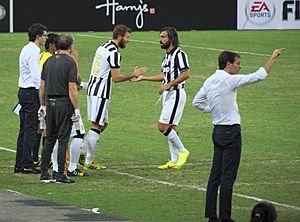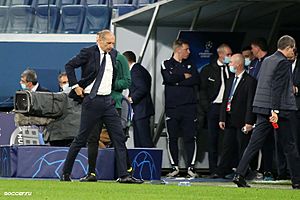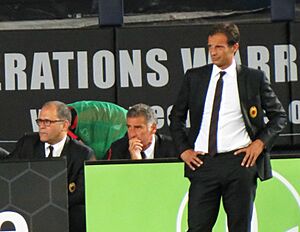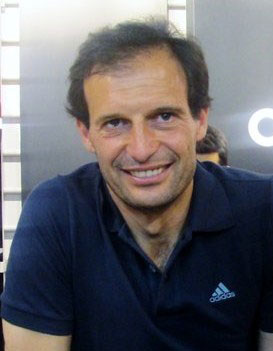Massimiliano Allegri facts for kids
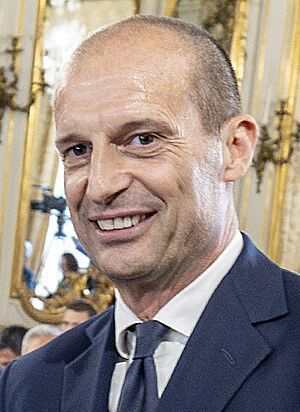
Allegri in 2024
|
|||
| Personal information | |||
|---|---|---|---|
| Full name | Massimiliano Allegri | ||
| Date of birth | 11 August 1967 | ||
| Place of birth | Livorno, Italy | ||
| Height | 1.83 m (6 ft 0 in) | ||
| Position(s) | Midfielder | ||
| Team information | |||
|
Current team
|
AC Milan (head coach) | ||
| Senior career* | |||
| Years | Team | Apps | (Gls) |
| 1984–1985 | Cuoiopelli | 7 | (0) |
| 1985–1988 | Livorno | 29 | (0) |
| 1988–1989 | Pisa | 2 | (0) |
| 1989–1990 | Livorno | 32 | (8) |
| 1990–1991 | Pavia | 29 | (5) |
| 1991–1993 | Pescara | 64 | (16) |
| 1993–1995 | Cagliari | 46 | (4) |
| 1995–1997 | Perugia | 41 | (10) |
| 1997–1998 | Padova | 21 | (0) |
| 1998 | Napoli | 7 | (0) |
| 1998–2000 | Pescara | 46 | (4) |
| 2000–2001 | Pistoiese | 18 | (1) |
| 2001–2003 | Aglianese | 32 | (8) |
| Total | 374 | (56) | |
| Managerial career | |||
| 2003–2004 | Aglianese | ||
| 2004–2005 | SPAL | ||
| 2005 | Grosseto | ||
| 2006 | Grosseto | ||
| 2007–2008 | Sassuolo | ||
| 2008–2010 | Cagliari | ||
| 2010–2014 | AC Milan | ||
| 2014–2019 | Juventus | ||
| 2021–2024 | Juventus | ||
| 2025– | AC Milan | ||
| *Club domestic league appearances and goals | |||
Massimiliano "Max" Allegri, born on August 11, 1967, is a famous Italian football manager and former player. He is currently the head coach of the Serie A club AC Milan.
As a player, Allegri was a midfielder. He played for several Italian teams, including Pisa, Pescara, Cagliari, Perugia, and Napoli. In 2002, he won the Serie D title with Aglianese before he stopped playing. When he played for Livorno, people called him "Acciughina" (Little Anchovy). This was because he was lean and quick. The Italian press still uses this nickname for him today.
Allegri started his coaching career in 2003. He helped Sassuolo get promoted to Serie B for the first time. He won the Serie C1 championship and Super Cup with them. From 2008 to 2010, he coached Cagliari in Serie A. He led them to their best finish in nearly 15 years.
His great work at Cagliari led him to AC Milan in 2010. He stayed there until January 2014. With Milan, he won a Scudetto (Italian league title) in the 2010–11 season. This was Milan's first league title since 2004. He also won a Supercoppa Italiana (Italian Super Cup) in 2011.
Between 2014 and 2019, Allegri coached Juventus. He won many trophies with them. These included five league titles in a row (from 2015 to 2019). He also won four Coppa Italia titles in a row (from 2015 to 2018). Plus, he won two Supercoppa Italiana titles (2015 and 2018). He also led Juventus to two UEFA Champions League finals (2015 and 2017).
After a break from coaching, he returned to Juventus in 2021. In his second time at the club, he won another Coppa Italia in 2024. However, he left the club a couple of days later. He returned as manager of AC Milan in May 2025.
Allegri has won many individual awards. He won the Panchina d'Oro (Golden Bench) four times. He was also named Serie A Coach of the Year four times. He is the only coach in Italian football history to win five league titles and four Coppa Italia titles in a row. He is also the only coach in Europe's top five leagues to win a domestic double for four seasons in a row.
Contents
Allegri's Playing Career
After playing in lower leagues, including his hometown club Livorno, Allegri joined Pescara in 1991. He was a skilled and creative player in midfield. His team, led by Giovanni Galeone, won promotion to Serie A in 1992.
Allegri played very well for Pescara in Serie A. Even though the team finished last, he scored an impressive 12 goals from midfield. He then played for Cagliari, Perugia, and Napoli. Later, he returned to Pescara. He also had short times at Pistoiese and Aglianese. He stopped playing football in 2003.
In 2000, Allegri faced a temporary ban from playing. This was due to an issue related to a Coppa Italia match.
Allegri's Coaching Journey
Starting as a Coach
Allegri began his coaching career in 2004. He managed Serie C2 team Aglianese. He had spent his last two years as a player at this club. After a good season, he moved to Grosseto in Serie C1. However, this time was not as successful, and he was replaced early in the 2006–07 season.
After leaving Grosseto, Allegri joined his mentor Giovanni Galeone at Udinese. He became part of his coaching team. But this was not allowed by Italian football rules because he was still under contract with Grosseto. This led to Allegri being suspended for three months in early 2008.
Success with Sassuolo
In August 2007, Allegri became the head coach of Sassuolo. This was an ambitious team in Serie C1. Allegri quickly led Sassuolo to the top of the league. On April 27, 2008, Sassuolo won the Serie C1/A league title. This was a historic moment, as it was their first-ever promotion to Serie B.
Coaching Cagliari
On May 29, 2008, Allegri was announced as the new head coach of Cagliari in the Serie A. He replaced Davide Ballardini. The team had a tough start, losing their first five league matches. But club chairman Massimo Cellino kept Allegri. Allegri then guided his team to a mid-table position by December.
On December 9, after a 1–0 home win against Palermo, Cagliari announced a two-year contract extension for Allegri. This new contract was set to end on June 1, 2011. He finished the 2008–09 season in an impressive ninth place. This was their best Serie A result in almost fifteen years. People praised this achievement because Cagliari had limited resources and not many top players. Their attacking style of football was also highly regarded.
These results earned him the Panchina d'Oro (Golden Bench) award. This award is given to the best Serie A football manager, voted by other managers. He won it ahead of José Mourinho, who had won the Serie A title. In the 2009–10 season, he kept Cagliari playing at a high level. Three of his players were called up to the Italy national team.
On April 13, 2010, Cagliari surprisingly removed Allegri from his coaching duties. This happened even though the team was in a solid 12th place. Youth coach Giorgio Melis took over as his replacement.
Leading AC Milan
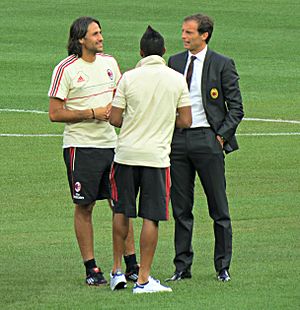
Cagliari released Allegri from his contract on June 17, 2010. This was because AC Milan wanted him as their new manager. On June 25, Allegri officially became Milan's new manager. In his first season, Allegri led Milan to their first league title since 2004. They beat their rivals Inter Milan in both league games.
Milan did not make it past the semi-finals of the Coppa Italia. They lost to Palermo. The team also played in the UEFA Champions League, but Tottenham Hotspur eliminated them.
His second season also started well. He led Milan to their sixth Supercoppa Italiana title on August 6, 2011. They won 2–1 against Inter in Beijing. However, that was the only trophy they won that season. They lost to Juventus in the Coppa Italia semi-finals. Barcelona knocked them out of the UEFA Champions League quarter-finals. Milan finished second in the league, behind Juventus.
On January 13, 2012, Allegri extended his contract with Milan until the end of the 2013–14 season. Many key players left or retired, and Milan struggled at the start of the 2012–13 season. They only had 8 points from their first 7 games. This put Allegri's job at risk. Despite criticism, Milan kept Allegri. He helped younger players like Stephan El Shaarawy, Mattia De Sciglio, and Mario Balotelli play their best.
Allegri guided Milan from 16th place to a 3rd-place finish. They had an exciting 2–1 comeback win against Siena. This result earned Milan a spot in the 2013–14 Champions League playoff round.
On June 1, 2013, club president Silvio Berlusconi confirmed Allegri would stay as manager. On December 31, 2013, Allegri said he would leave the club at the end of the season. However, Milan announced that Allegri and his staff were removed from their duties on January 13, 2014.
Coaching Juventus
On July 16, 2014, Allegri became the new head coach of Juventus. He replaced Antonio Conte. At first, some people were unsure about hiring Allegri. But on May 2, 2015, he led Juventus to their fourth league title in a row. They beat Sampdoria 1–0. This was only the second time Juventus had won four league titles in a row. Allegri had also won the title with AC Milan in 2011. This made it his second league title as a manager in Serie A.
On May 13, 2015, Allegri guided Juventus to the Champions League final. They beat the defending champions Real Madrid 3–2 over two games. It had been twelve years since Juventus last reached the final. They eventually lost to Milan in 2003. A week later, on May 20, 2015, Allegri led Juventus to a domestic double. They won their record tenth Coppa Italia, beating Lazio 2–1 in extra time. Juventus had not won this trophy since 1995. On June 6, 2015, Barcelona defeated Juventus 3–1 in the 2015 UEFA Champions League final.
On July 6, 2015, Allegri signed a contract extension with Juventus until the end of the 2016–17 season. On August 8, 2015, Allegri led Juventus to a 2–0 win over Lazio in the Supercoppa Italiana. New players Mario Mandžukić and Paulo Dybala scored the goals. Allegri was nominated for the 2015 FIFA World Coach of the Year Award. On December 14, 2015, Allegri won the Serie A Coach of the Year award. On March 7, 2016, he won his second Panchina d'Oro.
On April 25, Juventus won the 2015–16 Serie A championship. They had a difficult start but then went on a long unbeaten run. They won 24 of their next 25 league games to defend their title. On May 6, Allegri extended his contract as Juventus manager until 2018. On May 21, he led Juventus to another domestic double. They beat Milan 1–0 in the 2016 Coppa Italia Final. This made them the first team in Italy to win back-to-back doubles.
On May 17, 2017, Allegri led Juventus to their 12th Coppa Italia title. They won 2–0 against Lazio. This made them the first team to win three Coppa Italia titles in a row. Four days later, on May 21, Juventus won their sixth league title in a row. This set a new record for consecutive wins in the competition. On June 3, 2017, Allegri reached his second Champions League Final in three years with Juventus. However, they lost 4–1 to Real Madrid. On June 7, Allegri renewed his contract with Juventus until 2020.
Allegri managed his 200th game with Juventus on February 9, 2018. It was a 2–0 away win over Fiorentina. On May 9, 2018, Allegri won his fourth Coppa Italia title in a row. They won 4–0 against Milan. Four days later, on May 13, Allegri secured his fourth league title in a row. This made him the first manager in Europe's top five leagues to win four consecutive doubles. On May 17, 2019, Juventus announced that Allegri would leave the club at the end of the season. He left Juventus with a very high win percentage.
Return to Juventus
On May 28, 2021, Juventus announced Allegri's return as manager. He signed a four-year contract. Allegri's first match back was on August 22, a 2–2 away draw against Udinese. On November 23, Juventus lost 4–0 to Chelsea. This was their biggest loss since 2004. On January 15, 2022, Allegri reached his 300th game as Juventus coach.
On March 16, Juventus was knocked out of the 2021–22 UEFA Champions League after a 3–0 home defeat to Villarreal. On May 11, Juventus lost 4–2 after extra time to Inter in the Coppa Italia final. The 2021–22 season ended without any trophies. This was the first time since the 2010–11 season.
On November 2, Allegri managed his 100th Champions League match. It was a 2–1 home defeat against Paris Saint-Germain. Juventus had their worst-ever Champions League campaign that season. They won only three points and conceded many goals. For the first time since 2013–14, Juventus finished third in their group. This meant they moved to the UEFA Europa League. In the same month, Allegri won the Serie A Coach of the Month award. This was after three league wins against Inter, Hellas Verona, and Lazio.
On January 13, 2023, Juventus's eight-game winning streak in Serie A ended. They lost 5–1 to Napoli. Juventus had not conceded so many goals since 1993. Allegri's second season back also ended without a trophy. They lost 2–1 to Sevilla after extra time in the Europa League semi-finals.
On May 15, 2024, Allegri was sent off during Juventus's 1–0 victory over Atalanta in the 2024 Coppa Italia final. With this win, he became the first manager to win the title five times. He left the club just two days later on May 17. His actions after the final led to his departure.
Return to AC Milan
On May 30, 2025, Massimiliano Allegri was appointed as the new AC Milan manager. He returned to the club 11 years after his first time there.
Allegri's Coaching Style
Allegri is known for his smart tactics. He built on Antonio Conte's successful methods at Juventus. He first used Conte's 3–5–2 formation. Later, he switched to a four-player defense, especially in the Champions League. Under Allegri, Juventus became a bit less aggressive. Their playing style became more patient. They focused on keeping the ball to save energy.
Allegri's team was good at winning the ball in midfield. They also scored from quick counter-attacks. Their attacking play was often slower, with short passes. Allegri is also praised for being flexible. He used different formations at Juventus, like the 4–3-1-2, 4-4-2, and 4-3-3. He had used these at Milan too. This flexibility allowed talented players more freedom.
Andrea Pirlo said Allegri brought a "sense of calm" to the team. He helped players feel more confident. In his second season with Juventus, Allegri rebuilt the team. Key players like Pirlo, Vidal, and Tevez had left. Despite a bad start, Juventus came back to win the league title. They had a 15-match winning streak.
During the 2016–17 season, Allegri changed the team's formation. He sometimes used a 4–2–3–1 formation, especially for European games. This system suited the new players better. Gonzalo Higuaín became the main striker. Paulo Dybala played a more creative role. Mario Mandžukić played as a winger on the left side. This new role used his hard work and ability to help teammates.
Juventus could switch between 3–5–2 and 4–2–3–1 formations during matches. This was clear in their Champions League semi-final against Monaco. Juventus's defense was very strong. They only let in three goals on their way to the 2017 Champions League final. They lost 4–1 to Real Madrid in the final. Juventus ended the season by winning their third double in a row. This included a record sixth league title in a row.
In the 2017–18 season, Allegri used Blaise Matuidi in a new position. He played him as a left-sided defensive winger in a 4–2–3–1 formation. Matuidi often moved into the center to help the midfield. This role was similar to what he did for the France national football team.
In 2024, Juventus captain Danilo praised Allegri's intelligence. He also praised his ability to manage players off the field. Allegri himself described football as "simple" that same year. While he is good at managing players, some people have criticized his strict and defensive tactics. Especially during his second time at Juventus, some felt his style made the team's play less exciting.
Personal Life
Allegri was born in Livorno. His father worked at the port of Livorno, and his mother was a nurse. He grew up in Coteto. In 1992, when he was 24, he called off his wedding two days before the ceremony. In 1994, Allegri married Gloria Patrizi. They had a child, Valentina, a year later. He later had another child, Giorgio, in 2011 with another woman. From 2017, Allegri was in a relationship with actress Ambra Angiolini. They broke up in 2021.
Managerial Statistics
| Team | Nat | From | To | Record | |||||||
|---|---|---|---|---|---|---|---|---|---|---|---|
| G | W | D | L | GF | GA | GD | Win % | ||||
| Aglianese | 1 July 2003 | 30 June 2004 | 38 | 10 | 13 | 15 | 30 | 35 | −5 | 26.32 | |
| SPAL | 1 July 2004 | 30 May 2005 | 40 | 13 | 15 | 12 | 47 | 41 | +6 | 32.50 | |
| Grosseto | 19 July 2005 | 26 October 2005 | 20 | 6 | 9 | 5 | 21 | 18 | +3 | 30.00 | |
| Grosseto | 17 April 2006 | 29 October 2006 | 10 | 1 | 6 | 3 | 12 | 15 | −3 | 10.00 | |
| Sassuolo | 17 July 2007 | 28 May 2008 | 42 | 23 | 6 | 13 | 56 | 43 | +13 | 54.76 | |
| Cagliari | 29 May 2008 | 13 April 2010 | 74 | 27 | 15 | 32 | 100 | 106 | −6 | 36.49 | |
| AC Milan | 25 June 2010 | 13 January 2014 | 178 | 91 | 49 | 38 | 303 | 178 | +125 | 51.12 | |
| Juventus | 16 July 2014 | 26 May 2019 | 271 | 191 | 43 | 37 | 511 | 195 | +316 | 70.48 | |
| Juventus | 1 July 2021 | 17 May 2024 | 149 | 80 | 34 | 35 | 221 | 138 | +83 | 53.69 | |
| AC Milan | 30 May 2025 | Present | 0 | 0 | 0 | 0 | 0 | 0 | +0 | — | |
| Career Total | 822 | 442 | 190 | 190 | 1,301 | 769 | +532 | 53.77 | |||
Honours
Player
Livorno
- Coppa Italia Serie C: 1986–87
Aglianese
- Serie D: 2001–02 (group D)
Manager
Sassuolo
- Serie C1: 2007–08
Milan
- Serie A: 2010–11
- Supercoppa Italiana: 2011
Juventus
- Serie A: 2014–15, 2015–16, 2016–17, 2017–18, 2018–19
- Coppa Italia: 2014–15, 2015–16, 2016–17, 2017–18, 2023–24
- Supercoppa Italiana: 2015, 2018
Individual
- Panchina d'Oro Prima Divisione: 2007–08
- Panchina d'Oro: 2008–09, 2014–15, 2016–17, 2017–18
- Serie A Coach of the Year: 2011, 2015, 2016, 2018
- Enzo Bearzot Award: 2015
- Gazzetta Sports Awards – Coach of the Year: 2018
- Italian Football Hall of Fame: 2018
- Serie A Coach of the Month: November 2022, November 2023
See also
 In Spanish: Massimiliano Allegri para niños
In Spanish: Massimiliano Allegri para niños


